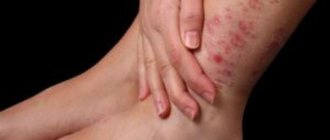Rose hips are the fruit of a rose (usually wild) and are a popular natural remedy for treating many ailments. Let's try to figure out why rosehip allergies occur. Let's look at the main symptoms and treatment methods for an allergic reaction.
Rose hips are rich in vitamin C, but are also a good source of lycopene, riboflavin, pectin, niacin and malic acid.
It also contains essential fatty acids such as: oleic acid, palmitic acid, linoleic acid, gamma-linolenic acid.
Allergy to rose hips is not common. The reaction can be provoked by:
- fresh fruits,
- dried and crushed fruits,
- oil, extracts,
- drinks: teas, decoctions, wine,
- dishes: jellies, jams, pies, soups,
- medicines: preparations, syrups, additives in cough mixtures
- cosmetical tools.
Causes and risk groups
- Hypersensitivity to substances contained in the fetus.
- Cross reactivity.
- It is possible to be allergic not to the fruits themselves, but to the substances with which they are treated during drying.
The likelihood of developing a rosehip allergy increases in people whose parents (one or both) suffered from this allergy. In addition, hypersensitivity to rose hips (up to the development of asthma) is an occupational disease and occurs among workers in the tea industry, in oil production, etc.
Quite often you can find information that an allergy to rosehip is associated with its high content of vitamin C and manifests itself after eating it in excess.
A true allergy to vitamin C (found naturally in fruits, vegetables and berries) is extremely rare. In all other cases, a negative reaction of the body can be caused by:
- Overdose is the main reason. The daily intake of the vitamin is up to 100 mg.
- Individual intolerance to the vitamin associated with a deficiency of the enzyme glucose-6-phosphate dehydrogenase (very rare).
- Synthetic vitamin C, which is part of vitamin complexes and medications.
These reactions are accompanied by symptoms similar to allergies.
Allergens
Rosehip allergen proteins have not yet been characterized.
Isolated lipid transfer protein (LTP) - 13 kDa
Cross allergy
Rosehip is part of the Rosaceae family, so cross-reactivity between its individual members is quite expected.
| The Family includes | |
| Pink Family | rosehip, apple, apricot, peach |
However, at the moment there was no evidence of a cross-reaction between rose hips and other members of the family.
In addition, a lipid transfer protein was discovered in rose fruits. This allergen can lead to cross-allergic reactions with other plants containing it. For example, apple, apricot and peach.
Can rose hips cause allergies?
Allergy to rose hips occurs in 40% of the population, who include it in their diet. The reasons for this are different, it all depends on the individual characteristics of the person. Allergy to rose hips occurs more often in children than in adults, because they do not have a strong enough immune system to fight such an irritant.
To maintain children's immunity and increase its resistance to other allergens, parents include various drinks in the baby's diet in the form of compote and teas made with rose hips. Such excessive and active consumption of the allergen leads to allergic reactions twice as fast.
The causes of allergy to rose hips at any age can be different, the main ones are:
- Cross allergy.
- Excessive use.
- Individual intolerance.
- Genetic predisposition.
- Hypersensitivity to substances that are part of it.
- Allergy to substances with which rose hips are processed during drying.
Only a specialist can determine the main causes of allergic reactions, who will perform a preliminary examination, take allergy tests and make the correct diagnosis.
There is a high probability of allergic manifestations due to genetic predisposition. If one of the parents in the past or present has hypersensitivity to rose hips, there is a 90% chance that his child will also encounter this phenomenon. Statistics indicate that every second professional worker in the tea industry has an allergy to rose hips, which he acquired as a result of his work.
There is an opinion that the reason for intolerance to rose hips is the content of vitamin C in it. An allergy to vitamin C, which this product is rich in, will not appear if you do not abuse this product, dose the amount of use, then no allergic manifestations in connection with vitamin C will be observed.
Symptoms of rosehip allergy
Manifestations of an allergic reaction can be local or general.
Photo: rashes near the girl’s mouth as a sign of local allergy to rose hips (can be enlarged)
- Skin: redness of the skin, itching, rash, urticaria, blistering, peeling, swelling of the skin and mucous membranes.
- From the respiratory system: feeling of nasal congestion, allergic rhinitis, suffocation, hoarseness.
- Visual organs: conjunctivitis, watery eyes.
- From the digestive system: abdominal pain, nausea, stool disorders.
- Quincke's edema.
- Anaphylactic shock.
People allergic to members of the Rosaceae family should remember that lipid transfer protein, an allergen that can cause serious systemic allergic reactions, is found primarily in the skin of the fruit and is resistant to elevated temperatures.
To reduce the risk of an allergic reaction, test on a small area of skin (wrist, elbow or chin) before using the oil. Cover the area where the oil is applied, for example with a light bandage, to avoid smearing the sample.
Leave the oil on the skin for 24 hours. If after a period of time no rash or other manifestations appear, then the likelihood of an allergic reaction is not high.
If your skin is irritated, wash off the oil thoroughly and do not use again. In case of severe irritation, consult a physician.
We recognize the problem in time
The symptoms are similar to those of a food allergy.
There is a disruption in the functioning of the skin, eyes, respiratory system and gastrointestinal tract:
- Swelling of the respiratory system.
The voice becomes hoarse. A cough and wheezing appear in the chest.
- From the gastrointestinal tract: nausea, vomiting, diarrhea.
- Skin: red spots, itching.
Scratching wounds until they bleed can lead to infection. - Inflammation of the eyes: redness, increased tearing.
A serious condition manifests itself if measures are not taken in a timely manner to eliminate the symptoms. Complications include bronchial asthma, Quincke's edema. The condition is very dangerous because it can get worse and...
Features of rosehip allergy in children
Is rosehip an allergen for babies? Unfortunately yes.
Usually, infants are given rosehip decoction from the age of four months. This useful product helps improve the child's immunity. Rosehip is also good for eliminating physiological jaundice in young children.
Sometimes mothers give their children a decoction or solution of rose hip syrup during teething - the calcium contained in rose hips is necessary during this important period.
The digestive system of an infant is not yet fully formed (the process lasts up to 3 years), enzymes are not produced in sufficient quantities. This increases the likelihood of an allergic reaction.
You should start administering the product with a few drops, gradually increasing the dose.
In addition, you should be careful with dosages - an excess of vitamin C is also harmful to the child’s body.
Most often, an allergy to rose hips in children is manifested by painful phenomena in the respiratory system and skin:
- an itchy, hyperemic rash and shortness of breath appear.
- There may also be disturbances in the gastrointestinal tract.
At the slightest suspicion of an allergic reaction, you must contact a specialist so that the child can receive qualified medical care.
You should be careful when using medications that contain rosehip syrup. Mothers need to study the instructions and give the drug in full accordance with the dosage.
Rosehip – allergenic or not?
Allergy to rose hips is rare. The body can react to the fruits of the plant, oil, medicines and cosmetics containing it. Sometimes the immune system reacts to substances that are used to treat fruits during drying. At risk are people who have a close relative with allergies, as well as workers who constantly come into contact with rose hips.
Dog-rose fruit
Rose hips contain:
- vitamin C;
- lycopene;
- riboflavin;
- pectin;
- nicotinic and malic acid.
Rose hips are also rich in essential fatty acids for humans.
There is an opinion that an allergy does not develop to rose hips, but to the vitamin C it contains. A true allergy to vitamin C is rare (see “Allergy to vitamin C (ascorbic acid) in children and adults”). The cause of development is overdose, intolerance and the use of a synthetic product.
Attention! If you are allergic to rosehip, a cross-reaction with apple, apricot and peach may occur.
The allergen is located in the peel of the fruit and is resistant to high temperatures.
Reasons for the development of an allergic reaction
An allergy from rosehip may be due to the body's hypersensitivity to substances contained in the fruit. It also occurs due to cross-reaction.
Sometimes an allergy develops in a baby while breastfeeding. Substances contained in rose hips enter the child’s body with milk.
Since they are new to the baby, the body may react negatively to them. Therefore, when breastfeeding, you need to monitor the baby’s condition.
At the first sign of an allergic reaction, the mother should stop using rosehip decoction.
Rose oil can also cause sensitivity. Only in this case you need to be careful. Rose oil has a laxative and choleretic effect, so stool upset is not always a manifestation of an allergy.
Symptoms of the disease
With a rosehip allergy, a person's skin becomes covered with red spots and blisters. It itches and swells. Peeling may appear on it. A person may also develop a runny nose and a hoarse voice.
The most dangerous symptom of an allergy is breathing problems.
Allergic manifestations in an adult
Symptoms of an allergic reaction may appear after contact with the fruits, leaves or juice of the plant. They trigger the body's defense mechanisms. When plant proteins are ingested, antibodies are produced. The eyes begin to water, and conjunctivitis may develop. If you take rosehip decoction internally, you may experience abdominal pain, nausea and stool upset.
The type of allergy manifestation will depend on the method of admission. If it is a decoction or tea, then digestive disorders will manifest themselves in the clinical picture. When an allergen has been applied to the skin, the contact area will be affected. It may develop a rash, redness, or swelling.
More severe manifestations of an allergic reaction are angioedema and anaphylactic shock . In the first case, the lips, cheeks, eyelids and mucous membranes swell and become deformed.
If fruits are eaten raw or not sufficiently processed at high temperatures, a person may develop an oral allergy.
It manifests itself as redness and irritation around the mouth, numbness of the tongue, swelling of the mucous membrane, sneezing, and rhinitis. Sometimes these symptoms are accompanied by asthma, conjunctivitis, and decreased visual acuity.
Manifestations of oral allergy persist for several hours.
On a note! Primary contact does not cause allergy symptoms. Any disorders occur upon repeated contact with the plant.
Allergy to rose hips in children
A child can also be allergic to rose hips. Usually, a decoction of the fruits begins to be given to infants from the age of four months. It strengthens the immune system and eliminates physiological jaundice. Rose hips are especially useful during teething, as they contain calcium.
The digestive system is formed up to 3 years of age. Since enzymes are not produced in sufficient quantities, the likelihood of developing an allergic reaction increases.
When giving a child a decoction, tincture or any other preparations with rose hips, you must strictly adhere to the dosage. An excess of vitamin C is harmful to the child's body.
In children, rosehip allergy manifests itself in the form of an itchy rash and shortness of breath. Sometimes there are disturbances in the functioning of the gastrointestinal tract (GIT).
If allergy symptoms appear in a child, you should contact your pediatrician as soon as possible.
Manifestations of an allergic reaction in a child appear in most cases 0.5-2 hours after taking rose hips. In some cases, febrile fever appears. There is an increase in body temperature above 38°C. Sometimes severe gastrointestinal disorders develop, which can lead to dehydration.
Symptoms of allergies in infants include diarrhea, vomiting, regurgitation, colic and facial swelling. In older age, a runny nose, shortness of breath, weakness, flatulence, and cough are observed. Dehydration can occur as a result of frequent bowel movements and repeated vomiting.
Diagnostics
First, the doctor finds out the patient’s manifestations of an allergic reaction and conducts an examination. To determine the presence of allergies, skin tests are performed and the level of immunoglobulin E is determined. The latter is carried out after the symptoms of the disease have been relieved.
During skin testing, small scratches are made on the body, and then a potential allergen is applied (see “Skin testing for diagnosing allergies” for more details). The test is considered positive if, after half an hour, swelling, itching, redness or blisters appear at the application site.
Skin tests can also reveal how sensitive you are to the allergen. During the diagnostic procedure, the patient experiences minimal discomfort. This study is carried out only in a specialized allergy office.
Important! The test is excluded if anaphylactic shock , which was associated with rose hips or cross allergens.
Before performing skin tests, your allergist should tell you about the medications you are taking and any medical conditions you have. The test is not given to people who have an active infectious disease.
Drug therapy
Treatment is carried out using medicines and traditional medicine methods. At the initial stage of the disease, antihistamines are usually used (see “Antihistamines in the treatment of allergies: mechanism of action and classification”), in more severe cases corticosteroids are used.
During treatment, various drops in the eyes and nose, ointments, creams, tablets, and solutions are used. They can be used separately from each other or in combination to enhance the effect. Medicines should be selected by a doctor.
Treatment of an allergic reaction
Treatment of rosehip allergies is carried out in two ways: with the help of medications and traditional medicine methods.
Before you start treatment, you need to stop using rose hips in any form (elimination), otherwise therapeutic measures will simply be useless
The most popular treatment for allergies is antihistamines. In case of severe manifestations of allergies, the “heavy artillery” is used: corticosteroid drugs.
The most common medications to combat allergy symptoms are:
But it is necessary to take into account that many antihistamines have side effects such as drowsiness and decreased attention.
Pregnant women need to be especially careful when taking antihistamines, because some of them (Diphenhydramine, Bicarfen, Ditek) have a detrimental effect on the fetus. Only a specialist can prescribe the medicine and its regimen!
Nasal medications are used to relieve the symptoms of allergic rhinitis.
Enterosorbents such as:
- Atoxyl,
- Activated carbon,
- Polysorb,
- Enterosgel.
Folk remedies
It is impossible to completely cure allergies using folk remedies, but they can alleviate the symptoms of the disease. Here are the most famous recipes for allergies (including rose hips).
Treatment with pharmaceutical drugs
Drug treatment is prescribed when a person experiences pronounced allergy symptoms that do not go away after eliminating the allergen. It is strictly prohibited to prescribe medications on your own; for this it is important to visit a specialist, take the necessary tests and get an answer regarding treatment.
The best drugs are antihistamines that quickly fight allergic manifestations, they are:
The dosage is indicated in the instructions and must be strictly followed. In combination with antihistamines, the specialist will prescribe a course of enterosorbents:
The drugs are taken in a course, and only with the right approach and treatment gives the desired result. Rosehip does not cure allergies, and taking it only provokes side effects if consumed excessively.

Answers to frequently asked questions
Maybe. An allergic reaction is manifested by a rash and hyperemia of the skin. The cause of true allergies is intolerance to substances contained in rose hips.
Maybe like any “new” product. A nursing mother does not need to drink too much rosehip decoction.
In this case, you need to very carefully monitor the baby’s condition. If your baby shows signs of an allergy, you should stop drinking the drink while you are breastfeeding. And remember - everything is good in moderation.
Quite. Moreover, both true (caused by individual intolerance to the substances that make up rose hips) and false, provoked by an excess of vitamin C, but this phenomenon is considered quite rare.
In adults, an allergic reaction can manifest itself as: skin itching, swelling of the mucous membranes, allergic rhinitis. More severe manifestations are nausea, vomiting, diarrhea, Quincke's edema. The most dangerous manifestation of allergies is anaphylactic shock.
In children, an allergy to rosehip decoction is manifested by the following symptoms.
- Skin itching, rashes, and sometimes urticaria.
- Conjunctivitis (eye redness, watery eyes).
- Cough.
- Allergic rhinitis.
Maybe. If hypersensitivity to rose hips occurs, then a very small amount is enough for an allergic reaction to occur.
To be able to quickly return to the article, keep a card with basic information about the allergen.
Rosehip is known as a medicinal plant that helps with anemia, immunodeficiency, liver and biliary tract diseases. Based on it, decoctions, infusions, dry mixtures, teas, as well as various sweets are prepared: marshmallows, marmalade, candies. The bright scarlet fruits are sources of ascorbic acid (vitamin C), the content of which is superior to black currants, apples and even citrus fruits. Their beneficial properties are used not only in traditional medicine; The plant extract is included in many industrially produced pharmacological preparations. There are practically no restrictions on the use of berries, however, individual sensitivity cannot be ignored - if an allergy to rose hips occurs, its consumption for food and for treatment purposes is strictly contraindicated.
Causes of allergies
Allergies occur as a specific response of the body to the ingress of an allergen. Since rosehip contains several components, it is obvious that one of them may cause an allergy.
In addition to vitamin C, the plant contains:
- lycopene (fights free radicals, breaks down fats);
- riboflavin (responsible for growth and reproductive functions, affects the condition of the skin, hair and nails);
- pectin (part of fabrics);
- malic acid (participates in metabolism);
- nicotinic acid (helps the formation of enzymes and lipid metabolism);
- oleic acid (plays a role in metabolic processes);
- linoleic acid (maintains hormonal balance, regulates cholesterol levels);
- palmitic acid (one of the energy sources);
- gamma-linoleic acid (improves brain metabolism, fights inflammation, pain, regulates the functions of the sex glands).
When they say that a person has an allergy, they rarely mention rose hips, because such susceptibility to this plant is rare. An allergic reaction can be triggered by:
- plant seeds;
- pulp;
- fruits of different stages of storage (fresh, dried);
- crushed fruits;
- rosehip oil;
- fruit extract;
- drinks from the plant (decoction, tea, infusion, wine);
- sweet dishes using fruits (jelly, pies, rosehip jam);
- medicines with rose hips;
- cosmetic products made from rose hips.
A person whose body may react inadequately to this medicinal plant has a weakened immune system. Hence the response to the incoming allergen.
The main cause of allergies is hypersensitivity to plant components. In addition, the development of this pathology is influenced by:
- cross-reactivity to different substances contained in the product;
- reaction to products used to treat fruits before drying;
- genetic predisposition;
- profession (work in the tea industry or oil production).
Many people associate rose hips exclusively with medicine, but not everyone knows that they may be allergic to it. Rosehip is considered a plant that contains vitamin C and strengthens the body. But this wild rose (the second name of the plant) must be used with caution, because for some people it can be an allergen.
Causes

Can you be allergic to rose hips? Yes, its possibility really exists. The symptoms are due to the presence of sensitization in the patient - a special form of immune sensitivity in which contact with berries, leaves, juice leads to the launch of protective mechanisms. It is based on an inadequately enhanced reaction to a stimulus, accompanied by the production of antibodies - it is initiated by the intake of plant proteins (proteins) with food or medicine. Young children can receive unfavorable substances in the milk of a mother who is not aware of the dangers of individual intolerance.
Is there a cross allergy to rose hips? The plant belongs to the Rosaceae family, members of which have a similar protein structure. This poses a risk of reaction to products such as:
In addition, rose oil can provoke sensitivity. It is necessary to distinguish immunological reactivity from an overdose of drugs based on berries and leaves. It is known that the fruits of the plant are used as a laxative and choleretic agent, so consumption in large quantities can lead to digestive disorders not associated with sensitization.
If you have an allergy caused by contact with rose hips, avoid not only raw berries, but also infusions, syrups, and teas that contain rose hips.
For a sensitive person, the fresh components of the plant are most dangerous - during heat treatment, unfavorable proteins lose their activity. However, researchers have proven that provoking substances can pass into the liquid in which fruits, leaves, and branches are located - and under the influence of high temperatures, the structure of proteins changes, as a result of which the allergic potential can increase many times over.
Causes of allergies
Experts associate an allergy to rose hips with vitamin C, since this component is the most abundant in the fruit. But the painful reaction is also provoked by other substances that make up the beneficial fruits. Despite the fact that there is nothing dangerous in them and the body needs them, people’s immunity recognizes them as foreign elements that need to be fought. This is due to a number of factors.
- Heredity. The risk of developing a rosehip allergy is high in those whose parents suffered from this problem.
- Professional activity. An allergic reaction to rose hips can occur in people working in the tea industry, associated with the production of oils, etc.
- Overdose. Eating rose hips and dishes with them in large quantities risks an excess of vitamin C, which is perceived by the immune system as a dangerous element, as a result of which a protective reaction is activated. An allergic reaction occurs in a baby if a woman who is breastfeeding includes fruits in her diet too often.
- Vitamin C intolerance. If a person suffers from an allergy to citrus fruits, most likely, rose hips will also cause a negative reaction in the body.
- Substances used to treat fruits. We are talking about purchased rose hips. During drying, it can be treated with substances that are unpleasant for the immune system. It’s easy to check: if the reaction appears after purchasing rose hips, you need to take the fruits you prepared yourself and look at the body’s reaction.
There is a possibility of cross-allergy to representatives of the Rosaceae family, which includes rose hips: peach, apricot and others.
Some babies are introduced to rose hips from four months, when the mother adds syrup or decoction to mixed feeding. But the baby’s body is highly sensitive to all foods that contain a lot of vitamin C.
Allergies are provoked by rose hips, oils, decoctions, and teas made from it. Food, cosmetics and medicines pose a danger.
Symptoms

They arise primarily in the area of direct contact:
- mucous membrane of the oral cavity, pharynx;
- esophagus, stomach, intestines;
- skin.
The type of manifestation depends on the method of entry of the allergen into the body. If an adult or child eats raw or heat-treated fruits, or uses medicinal infusions and decoctions, digestive disorders occupy a key place in the clinical picture. However, when applied externally (for example, to eliminate dryness and flaking, age spots), the contact area suffers - face, arms, legs, back, etc.
Dermatological manifestations
These include changes in the skin, as well as in mucous membranes accessible to visual inspection (mouth, genitals). Symptoms of an allergy to rose hips are observed after different times from the moment of contact (from a few seconds to 12 hours). Among them are the following signs:
- Itchy rash.
- Redness (hyperemia) and swelling.
- The appearance of peeling.
Features of the course in children
Since there is no doubt whether a child may have an allergy to rose hips, it is important to have an idea of the main manifestations. They are not much different from the reaction in adults, but there are several significant nuances:
- likelihood of febrile fever (increase in body temperature to 38.1–38.9 °C);
- risk of generalized urticaria;
- severe gastrointestinal disorders that threaten dehydration.
An infant may respond to contact with plant proteins with gastrointestinal disorders, changes in the skin and mucous membranes. Typical symptoms for a baby:
- Regurgitation.
- Nausea, vomiting.
- Colic in the stomach.
- Diarrhea, constipation, bloating.
- Itchy rash (blisters, blisters).
- Swelling of the lips, eyelids, cheeks.
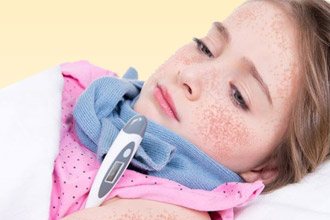
Allergy to rose hips in children of any age can be accompanied by:
- runny nose;
- conjunctivitis;
- shortness of breath, cough;
- joint pain;
- colic, flatulence;
- general weakness;
- sleep disturbance.
Dehydration occurs as a result of frequent bowel movements and repeated vomiting, especially if these disorders occur against the background of a significantly elevated body temperature.
Comments
Yana June 16, 2013, 10:15 pm
Rosehip is a very strong allergen!!!
Karina June 19, 2013, 14:42
yes, it was an overdose of vitamin C(((
Didn’t your doctor tell you that vitamins are a strong allergen? Especially rosehip. Clean it up immediately. Then, when the rash goes away, after a month, drink a little (and observe).
Karina April 27, 2013, 15:30
already removed...
The allergist told us that everything that blooms with flowers can provoke a reaction (rose hips blooming?)
Karina April 27, 2013, 08:09
I don’t know)) I probably should, the fruits are supposed to always come after the flowers))) we’ve been drinking it for a year and everything was normal... despite atopic dermatitis...
RESULTS хоже на краР¿Ð¸Ð²Ð½Ð¸Ñ†Ñƒ и Ñ Ñ‚Ð°Ð½Ð¾Ð²Ð¸Ñ‚Ñ Ñ Ñ…ÑƒÐ¶Ðµ Ð¾Ð±Ñ€Ð°Ñ‚Ð¸Ñ‚ÐµÑ Ñ Œ рочно к врР°Ñ‡Ñƒ Ñ Ñ‚Ð¾ Ð¾Ð¿Ð°Ñ Ð½Ð¾!
Source
07/25/2017 Allergy to rose hips is the body’s reaction to the substances contained in it, as well as to vitamin C. The fruits contain fatty acids, malic acid, pectin and components. Allergy to rose hips in children occurs when parents include syrup or decoction of the fruit in their diet to strengthen the immune system.
Diagnostics
This is a complex of studies, which necessarily includes a survey and examination of the patient. Compiling a list of additional tests is the doctor’s task, as is the correct interpretation of the results obtained and the selection of therapy based on them.
Skin tests
This is a reliable method of confirming the diagnosis, recognized by experts all over the world. To find out whether there is a reaction to rose hips, a small dose of the allergen is applied to the forearm, back (there is also an injection option). Then the patient is observed for at least half an hour. The test is considered positive if:
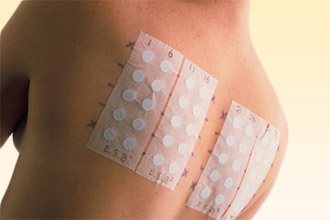
The appearance of these signs indicates the presence of sensitivity to the alleged provocateur. In addition, using a test you can determine how strongly it is expressed. The procedure does not cause pain and is generally accompanied by minimal discomfort for the patient - manipulations are performed with small instruments and only in a specialized allergy room, equipped with everything necessary to provide emergency care.
The result of the study is influenced by the use of medications (antihistamines, beta-blockers, sedatives, etc.), as well as the presence of pathological changes in the skin in the area of simulated contact (dermatitis, eczema, burns, scratches).
At the stage of planning the examination, it is important to discuss with the doctor the medications the patient is taking and find out if there are any dermatological diseases. The test should not be performed on people with active infections. The sample is excluded if anaphylactic shock associated with rose hips or cross allergens has previously been observed.
Blood analysis
A study of general parameters (leukocyte formula) will help to identify only one laboratory symptom - an increase in the number of eosinophil cells, and sometimes also basophils. This is not reliable evidence of sensitivity to rose hips - the detection of specific IgE class antibodies to plant allergens is much more informative. To conduct the study, venous blood (serum) is used. Indications for implementation may be:
- The patient refuses skin tests.
- Risk of anaphylactic shock from direct contact with a provoking substance.
- Common eczema, psoriasis.
- Impossibility of even temporarily interrupting medications.
The allergist decides which method to choose depending on the individual characteristics of the patient’s body.
Treatment
Selected after diagnostic tests, includes the main goals:
- elimination of pathological manifestations;
- minimizing discomfort associated with individual sensitivity.
Elimination approach
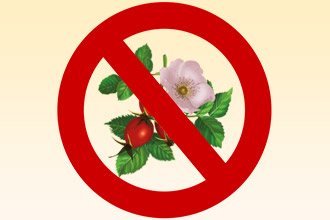
People who have experienced the role of an allergy sufferer at least once know that the reaction can be extremely painful. To avoid its recurrence, you must adhere to several rules:
- Do not use rose hips for food.
- Avoid homemade and pharmaceutical plant-based medicines.
- Identify cross allergens and avoid contact with them.
It is important to remember that children may have a hidden reaction - for example, constant constipation, colic. At the same time, the infant depends on the mother’s nutrition, and natural feeding is the most beneficial for his body. Therefore, diet correction is mandatory in any case. Changing the diet, as a rule, contributes to a significant improvement in the patient's condition.
Desensitizing treatment
To eliminate disorders associated with rose hip intolerance, pharmacological drugs are used:
- antihistamines (Cetirizine, Erius);
- topical glucocorticosteroids (Tafen nasal, Elokom).
If you follow the principles of the elimination approach, a short course of treatment is sufficient, after which the symptoms no longer bother you.
Why is the body unhappy?
Its composition helps to understand whether rosehip should be perceived as a real allergen or not.
It contains pectin, malic acid, fatty acids and vitamin C. Approximately 100 grams of peeled fruits contain 80 grams of vitamin C. Most often, it is this that causes an allergic reaction. But other components can also provoke a negative response from the body.
To a greater extent, symptoms of allergy to rose hips appear in children.

This is due to the fact that the child’s immune system has not yet been formed and strong irritants can lead to a reaction.
The main causes of the problem:
- Professional activity. For example, this applies to people who work in the tea industry.
- Vitamin C intolerance. This mainly occurs in people who suffer from allergies to citrus fruits. Eating rose hips is dangerous for infants.
- Abuse of fruits. When consuming large amounts of rose hips, allergic symptoms may appear.
- Nitrates, which are used to treat rose hips during drying.
- A reaction in a baby may occur when the mother adds rose hips to the broth.
In the first time after birth, the child’s immunity is acutely sensitive to foods that contain vitamin C.
If you have an individual intolerance to rose hips, you should stop using medications, cosmetics or dishes containing it.
Usually, parents first give rosehip decoction to their child at 4 months to improve the body’s protective properties. But it is the content of a large amount of vitamin C that leads to allergies.

The fruits are used when a child is teething because they contain a large amount of calcium.
The appearance of individual intolerance is due to the fact that the child’s digestive system is not fully formed.
Diet features

Disorders associated with sensitivity to rose hips can manifest themselves in different forms. However, regardless of whether the patient has damage to the gastrointestinal tract, dietary changes are required in accordance with the recommendations of the allergist.
- Decoctions, teas, compotes based on allergen plants.
- Any dishes containing fresh or cooked apples.
- Hawthorn tinctures, alcoholic drinks for the preparation of which berries are used.
First of all, fresh fruits and liquids containing plant extracts should be avoided. Cross allergens are no less dangerous than rosehip itself - it is important not to forget about this. It is necessary to adhere to the diet throughout the patient’s life. If we are talking about a mother who needs to feed her child, the diet should be compiled under the guidance of a qualified nutritionist.
Prevention and useful tips
To avoid an allergic reaction, you must:
- monitor your diet and always remember your doctor’s recommendations;
- do not give rose hips to small children, especially raw;
- refuse the herbal product if you are sensitive to apples, hawthorn or bird cherry;
- If suspicious symptoms appear, be examined by a specialist.
It is worth knowing that a child’s intolerance to fruits and medicines based on them can disappear over time - this can happen due to the gradual maturation of functional systems and the establishment of the mechanisms of their work. However, for an adult, the chances of such an outcome are extremely low - most likely, the allergy will persist forever. Therefore, you should not neglect your doctor’s advice, especially considering that rose hips can be easily replaced with other, safer berries.
Allergies to rose hips are quite common. Not everyone knows that rosehip or syrup from its berries, often used in baby food, can be strong allergens due to their high vitamin C content.
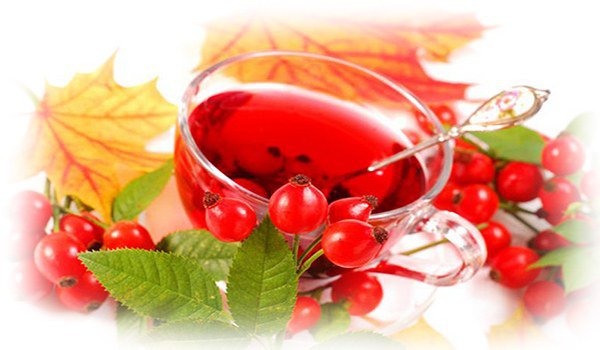
In 100 gr. peeled rose hips contain up to 800 grams. vitamin C in its pure form, so it is not surprising if an allergic reaction can develop after heavy consumption of berries. Most often, an allergic reaction can be observed in children, since their immune system is not sufficiently developed and an increased attack of allergens is accompanied by characteristic symptoms.
Folk remedies for allergies
These methods, like pharmaceuticals, will not completely rid a person of the disease. But they can quickly and effectively relieve symptoms, especially disturbances in the digestive process. Most often, bran is used for this. A spoonful of raw materials is poured only with boiling water, left to swell for 10 minutes. Then eaten before the main meal.
One of the most effective methods is taking baths with decoctions of medicinal herbs. They can be brewed either individually or as a group. It is worth noting that for dry, flaky skin, it is better to use herbs that do not have a drying effect.
An allergy to rose hips requires mandatory consultation with a certified specialist. It is strongly recommended not to take any therapeutic measures yourself. Often this approach leads to fatal consequences.
Compliance with doctor's instructions, diet and an integrated approach contribute to a quick solution to the problem. Preventing exacerbations and unpleasant consequences of self-medication.
allergiku.com
Allergic reactions in children can occur at any age. it is impossible (for example: an allergy to the flowering of certain plants), then a pediatrician. The phenomenon of flowering in newborns worries many people. skin in newborn babies can easily be confused with prickly heat or allergies. Flowering infants are a hormonal rash. It is important to distinguish flowering of infants from allergies. There is usually no treatment for flowering infants. Allergies can occur in newborns due to the fact that the nursing mother has eaten. According to statistics, every fifth child in the world suffers from allergies. The manifestation of the disease at an early age is very often similar to symptoms. 6 Feb. Does your baby have acne on his face? It could be neonatal acne. Acne symptoms. Causes of acne. How to treat correctly. I looked on the Internet, but many different diseases fit these symptoms: allergies, prickly heat, flowering in a newborn, diathesis. In each. 4 May. What are the causes of childhood allergies? How dangerous are its unpleasant symptoms, and how to overcome them? Is it possible to cure? 12 07 2020 . Development of a child up to one year by month, development calendar from 1 to 12 months. I sleep with them in the same bed with my nose in the wool without any . Symptoms and manifestations of allergies in children. 20 most. In infants, allergies manifest not only as skin rashes, but also. flowering plants. Causes and treatment of allergies in children. The manifestations of allergies are varied, and for infants they pose a particular danger: at this age.
In everyday life, this phenomenon is called newborn bloom. After all, a child’s bloom is very easy to confuse with allergies and staphylococcus, as well as other fungal diseases. Flowering symptoms in newborns. Can there be an allergy to rosehip, rosehip oil, rosehip decoction? Rose hips can and quite often cause allergies in children. Vitamin C . Causes of allergies to ragweed: . in children is a seasonal disease, then on the eve of flowering of this type of weed should be done as much as possible. Stages of development of allergies in infants and signs of the disease. Peculiarities . Allergies occur only during the flowering period of specific plants. 12 07. This is not an allergy, as pimples migrate: here today, there tomorrow. We decided it was newborn bloom, a hormonal rash. Allergies in newborns are very different in external manifestations from. Why does allergic rhinitis occur in children, what are its symptoms and how to treat it. or other atypical reactions to various stimuli: flowering plants, . We can say that allergies and allergic rhinitis are In recent years, there has been a steady increase in cases of food allergies in infants, which is especially important during the period of introducing complementary foods or. 07/14/2020. Flowering of newborns: what is this phenomenon, why does it occur. in a newborn indicate, first of all, the following symptoms: . Most often it is compared with problems such as allergies and prickly heat. How to distinguish allergies from flowering in a baby. Is it possible to treat? Causes and symptoms. Pimples on a baby's face: allergy or bloom? 12 Jan. Take the child out for the period of flowering and progression of hay fever. Allergy and its symptoms. Prevention of allergies in children. . the newborn develops unambiguous symptoms. However, what makes an allergy to flowering different is the formation of yellow flowers. 15 Aug - 5 - Health-saving channel 2. Treatment of acne during pregnancy. 3. Acne of newborns - neonatal rash. 4. Newborn acne or allergies. 5. Treatment. The article discusses problems such as allergies to cats, dust, milk. The main symptoms of allergies in children are considered to be various... My son has the same allergy to flowers in the spring, and this happens every season. In order to choose an allergy cream for children, a large... What are the symptoms of a flowering allergy in a child? Symptoms.
vk.com
Symptoms of the disease
As a rule, a negative reaction to rose hips (in children especially to syrup) occurs with symptoms characteristic of all allergic diseases. It can be expressed by the following manifestations:
- hyperemia of the skin;
- the appearance of a rash on the body, accompanied by unbearable itching;
- subsequently, the skin at the site of the rash may peel off;
- increased lacrimation and rhinitis are observed;
- the patient begins to cough and sneeze heavily;
- wheezing and shortness of breath are noted;
- hyperthermia, increased fatigue;
- hypertension and a sharp increase in blood glucose;
- dyspeptic disorders.
In more severe cases, angioedema or anaphylactic shock may develop. These conditions require emergency medical intervention. When determining the diagnosis, it is necessary to take into account that similar symptoms can be caused by any products that contain rose hips or products with its addition (decoction, vitamins, medicines, syrup, etc.).
Therapeutic measures
First of all, it is necessary to exclude all products with the addition of rosehip, including syrup and medicines containing it.
- To relieve an acute allergic reaction, antihistamines are prescribed to suppress the production of histamine in the body. These include Telfast, Tavegil, Zyrtec, Claritin, etc. These drugs actively relieve allergy symptoms. However, it should be borne in mind that first-generation drugs have side effects such as drowsiness and lethargy;
- to accelerate the elimination of toxic substances, it is recommended to use enterosorbents (Enterosgel, Activated carbon, Polysorb, etc. In especially severe cases, hormonal therapy is prescribed (Prednisolone, Hydrocortisone, etc.);
- In addition to drug therapy, traditional medicine can be used. It is quite clear that it is impossible to be completely cured with the help of medicinal herbs and tinctures, but there is a possibility of reducing acute manifestations.
To relieve swelling, it is recommended to take baths containing a decoction of medicinal herbs (celandine, chamomile, calendula, linden, string, etc.).
To relieve defects in the digestive system, it is recommended to finely chop 1 kg. garlic and pour 1 liter of boiled water over this mixture. The prepared broth is stored in a dark place for 4 days. After this, the tincture is taken 1 teaspoon at a time, which must first be diluted in 200 ml. warmed milk before eating.
Important! Any allergy treatment, including traditional medicine, can only be carried out after prior consultation with a doctor. This will allow you to get rid of allergies as quickly as possible, as well as avoid various complications.
First of all, it is necessary to exclude all products with the addition of rosehip, including syrup and medicines containing it.
Allergy to rose hips in childhood
The first acquaintance of a baby with rose hips occurs at 4 months with mixed feeding. It is recommended to give a decoction or syrup of rose hips to increase immune strength, for hyperthermia, to relieve constipation and treat physiological jaundice in infants.
In addition, doctors strongly recommend giving rosehip decoction during teething. The reason for this is the increased calcium content in the fruits, which is so necessary for babies at this time. However, it should be remembered that the baby’s body is very sensitive to all products with a high content of vitamin C.
Ascorbic acid can cause an allergic reaction as an independent component, and in combination with various highly allergenic foods (citrus fruits, strawberries, etc.) an allergic reaction can develop instantly, especially in a child.
In children, the respiratory tract and skin are the most sensitive to the effects of the allergen, manifesting themselves in severe shortness of breath and a hyperemic rash throughout the body. In addition, an excess of vitamin C can provoke dyspeptic disorders in the gastrointestinal tract. If acute symptoms develop, immediate medical attention is required.
Caution must be exercised when using various medications by children, because very often they contain syrup from rose hips. Therefore, before use, you need to carefully read the instructions for the medicinal product. In addition, you should definitely follow the dosage recommended for children, because it is its excess that provokes an acute attack of allergies.
Diagnosis and treatment
Both adults and children suffer from this pathology. To alleviate the patient’s condition, you must first remove rose hips and dishes and medicines that contain them from the diet. This is done when the allergen has been accurately identified, and it turns out to be rose hips.
Diagnosis of allergies is carried out on the basis of blood tests (to detect immunoglobulin E) and skin tests.
Allergy to rose hips in children can appear literally from 4 months of age. During this period, mothers begin to give their infants a rosehip decoction. It is useful for:
- strengthening the baby's immunity;
- elimination of physiological jaundice of newborns.
When children begin to teethe, they are given a decoction (or syrup) of rose hips. Since it contains calcium, it is a necessary measure for the growth of strong teeth.
An allergy to rose hips in an infant may be a consequence of insufficient development of the digestive tract. This system has not yet formed, so the baby experiences a lack of enzyme production, which affects the body’s reaction to a particular product.
Therapy consists of taking medications and (additionally) traditional medicine. First of all, the doctor prescribes antihistamines, which the pharmaceutical industry produces in large quantities and variety. There are also such drugs for children. If the disease has gone too far and the patient’s condition is on the verge of critical, then corticosteroids are added.
Mothers whose children are breastfed should be careful about consuming products that contain rose hips, as well as vitamin C. You should not use creams, shampoos, gels and other cosmetic products containing rose hips.
We recommend reading: Gooseberries: benefits and harms, calorie content, weakens or strengthens, beneficial properties and contraindications of berries, leaves, twigs
When taking antihistamines, it should be noted that some of them may have side effects such as drowsiness and decreased concentration. In addition, some medications have contraindications such as pregnancy. Such medications have a detrimental effect on the development of the fetus. Which drug to choose is the doctor’s task. He also prescribes a treatment regimen.
A common companion to allergies is a runny nose. To remove this symptom, use nasal medications (nasal drops). Enterosorbents are taken to remove toxins from the body.
If a child is allergic to rose hips, parents should review their diet and exclude those foods that contain large amounts of vitamin C (for example, citrus fruits). Prescribed therapy for other diseases also requires attention. Ascorbic acid prescribed by a doctor should also be on the list of prohibited drugs.
As for traditional medicine recipes, they cannot fight the very cause of the disease, but they are quite capable of relieving the symptoms and alleviating the patient’s condition.
For example, with skin manifestations of allergies in adults and children, baths with herbal decoctions (chamomile, chamomile) help. They relieve itching, eliminate peeling, redness of the skin and soothe the patient. And allergenic foods should be excluded from the diet.
As for traditional medicine recipes, they cannot fight the very cause of the disease, but they are quite capable of relieving the symptoms and alleviating the patient’s condition.








